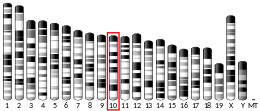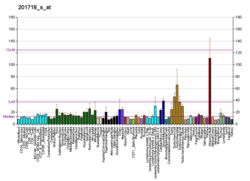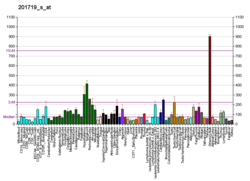EPB41L2
Band 4.1-like protein 2 is a protein that in humans is encoded by the EPB41L2 gene.[5][6][7]
Interactions
EPB41L2 has been shown to interact with FKBP2[8] and GRIA1.[9]
gollark: Also dying of now easily preventable diseases.
gollark: Sure, but it is lack of that which causes unhappiness!
gollark: It's weird how stuff is actually much better than it used to be by loads of metrics but people still feel awful.
gollark: So don't study and watch as they get annoyed!
gollark: You should suggest to them that they have unrealistic expectations.
References
- GRCh38: Ensembl release 89: ENSG00000079819 - Ensembl, May 2017
- GRCm38: Ensembl release 89: ENSMUSG00000019978 - Ensembl, May 2017
- "Human PubMed Reference:". National Center for Biotechnology Information, U.S. National Library of Medicine.
- "Mouse PubMed Reference:". National Center for Biotechnology Information, U.S. National Library of Medicine.
- Parra M, Gascard P, Walensky LD, Snyder SH, Mohandas N, Conboy JG (April 1998). "Cloning and characterization of 4.1G (EPB41L2), a new member of the skeletal protein 4.1 (EPB41) gene family". Genomics. 49 (2): 298–306. doi:10.1006/geno.1998.5265. PMID 9598318.
- Peters LL, Weier HU, Walensky LD, Snyder SH, Parra M, Mohandas N, Conboy JG (December 1998). "Four paralogous protein 4.1 genes map to distinct chromosomes in mouse and human". Genomics. 54 (2): 348–50. doi:10.1006/geno.1998.5537. PMID 9828140.
- "Entrez Gene: EPB41L2 erythrocyte membrane protein band 4.1-like 2".
- Walensky LD, Gascard P, Fields ME, Blackshaw S, Conboy JG, Mohandas N, Snyder SH (April 1998). "The 13-kD FK506 binding protein, FKBP13, interacts with a novel homologue of the erythrocyte membrane cytoskeletal protein 4.1". The Journal of Cell Biology. 141 (1): 143–53. doi:10.1083/jcb.141.1.143. PMC 2132710. PMID 9531554.
- Shen L, Liang F, Walensky LD, Huganir RL (November 2000). "Regulation of AMPA receptor GluR1 subunit surface expression by a 4. 1N-linked actin cytoskeletal association". The Journal of Neuroscience. 20 (21): 7932–40. doi:10.1523/jneurosci.20-21-07932.2000. PMC 6772741. PMID 11050113.
Further reading
- Andersson B, Wentland MA, Ricafrente JY, Liu W, Gibbs RA (April 1996). "A "double adaptor" method for improved shotgun library construction". Analytical Biochemistry. 236 (1): 107–13. doi:10.1006/abio.1996.0138. PMID 8619474.
- Yu W, Andersson B, Worley KC, Muzny DM, Ding Y, Liu W, Ricafrente JY, Wentland MA, Lennon G, Gibbs RA (April 1997). "Large-scale concatenation cDNA sequencing". Genome Research. 7 (4): 353–8. doi:10.1101/gr.7.4.353. PMC 139146. PMID 9110174.
- Walensky LD, Gascard P, Fields ME, Blackshaw S, Conboy JG, Mohandas N, Snyder SH (April 1998). "The 13-kD FK506 binding protein, FKBP13, interacts with a novel homologue of the erythrocyte membrane cytoskeletal protein 4.1". The Journal of Cell Biology. 141 (1): 143–53. doi:10.1083/jcb.141.1.143. PMC 2132710. PMID 9531554.
- Shen L, Liang F, Walensky LD, Huganir RL (November 2000). "Regulation of AMPA receptor GluR1 subunit surface expression by a 4. 1N-linked actin cytoskeletal association". The Journal of Neuroscience. 20 (21): 7932–40. doi:10.1523/jneurosci.20-21-07932.2000. PMID 11050113.
- Kontrogianni-Konstantopoulos A, Frye CS, Benz EJ, Huang SC (June 2001). "The prototypical 4.1R-10-kDa domain and the 4.1g-10-kDa paralog mediate fodrin-actin complex formation". The Journal of Biological Chemistry. 276 (23): 20679–87. doi:10.1074/jbc.M010581200. PMID 11274145.
- Gimm JA, An X, Nunomura W, Mohandas N (June 2002). "Functional characterization of spectrin-actin-binding domains in 4.1 family of proteins". Biochemistry. 41 (23): 7275–82. doi:10.1021/bi0256330. PMID 12044158.
- Binda AV, Kabbani N, Lin R, Levenson R (September 2002). "D2 and D3 dopamine receptor cell surface localization mediated by interaction with protein 4.1N". Molecular Pharmacology. 62 (3): 507–13. doi:10.1124/mol.62.3.507. PMID 12181426.
- Delhommeau F, Vasseur-Godbillon C, Leclerc P, Schischmanoff PO, Croisille L, Rince P, Morinière M, Benz EJ, Tchernia G, Tamagnini G, Ribeiro L, Delaunay J, Baklouti F (October 2002). "A splicing alteration of 4.1R pre-mRNA generates 2 protein isoforms with distinct assembly to spindle poles in mitotic cells". Blood. 100 (7): 2629–36. doi:10.1182/blood.V100.7.2629. PMID 12239178.
- Lu D, Yan H, Othman T, Turner CP, Woolf T, Rivkees SA (January 2004). "Cytoskeletal protein 4.1G binds to the third intracellular loop of the A1 adenosine receptor and inhibits receptor action". The Biochemical Journal. 377 (Pt 1): 51–9. doi:10.1042/BJ20030952. PMC 1223836. PMID 12974671.
- Ralston KJ, Hird SL, Zhang X, Scott JL, Jin B, Thorne RF, Berndt MC, Boyd AW, Burns GF (August 2004). "The LFA-1-associated molecule PTA-1 (CD226) on T cells forms a dynamic molecular complex with protein 4.1G and human discs large". The Journal of Biological Chemistry. 279 (32): 33816–28. doi:10.1074/jbc.M401040200. PMID 15138281.
- Beausoleil SA, Jedrychowski M, Schwartz D, Elias JE, Villén J, Li J, Cohn MA, Cantley LC, Gygi SP (August 2004). "Large-scale characterization of HeLa cell nuclear phosphoproteins". Proceedings of the National Academy of Sciences of the United States of America. 101 (33): 12130–5. Bibcode:2004PNAS..10112130B. doi:10.1073/pnas.0404720101. PMC 514446. PMID 15302935.
- Rual JF, Venkatesan K, Hao T, Hirozane-Kishikawa T, Dricot A, Li N, Berriz GF, Gibbons FD, Dreze M, Ayivi-Guedehoussou N, Klitgord N, Simon C, Boxem M, Milstein S, Rosenberg J, Goldberg DS, Zhang LV, Wong SL, Franklin G, Li S, Albala JS, Lim J, Fraughton C, Llamosas E, Cevik S, Bex C, Lamesch P, Sikorski RS, Vandenhaute J, Zoghbi HY, Smolyar A, Bosak S, Sequerra R, Doucette-Stamm L, Cusick ME, Hill DE, Roth FP, Vidal M (October 2005). "Towards a proteome-scale map of the human protein-protein interaction network". Nature. 437 (7062): 1173–8. Bibcode:2005Natur.437.1173R. doi:10.1038/nature04209. PMID 16189514.
- Beausoleil SA, Villén J, Gerber SA, Rush J, Gygi SP (October 2006). "A probability-based approach for high-throughput protein phosphorylation analysis and site localization". Nature Biotechnology. 24 (10): 1285–92. doi:10.1038/nbt1240. PMID 16964243.
- Ewing RM, Chu P, Elisma F, Li H, Taylor P, Climie S, McBroom-Cerajewski L, Robinson MD, O'Connor L, Li M, Taylor R, Dharsee M, Ho Y, Heilbut A, Moore L, Zhang S, Ornatsky O, Bukhman YV, Ethier M, Sheng Y, Vasilescu J, Abu-Farha M, Lambert JP, Duewel HS, Stewart II, Kuehl B, Hogue K, Colwill K, Gladwish K, Muskat B, Kinach R, Adams SL, Moran MF, Morin GB, Topaloglou T, Figeys D (2007). "Large-scale mapping of human protein-protein interactions by mass spectrometry". Molecular Systems Biology. 3 (1): 89. doi:10.1038/msb4100134. PMC 1847948. PMID 17353931.
This article is issued from Wikipedia. The text is licensed under Creative Commons - Attribution - Sharealike. Additional terms may apply for the media files.





